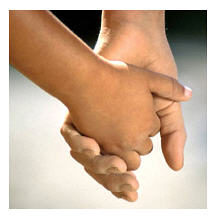When I wrote about the film, Closer, I was intrigued by the fine line between honesty and dishonesty, genuine connection and its simulation, and the ways in which we deceive ourselves when we love. There is nothing more fascinating – to me – than adults dealing with each other. Men and women, interacting.
 The issue of relationship trust is a tricky one – the facility of some to lie, the willingness of others to see what they want, rather than what is.
The issue of relationship trust is a tricky one – the facility of some to lie, the willingness of others to see what they want, rather than what is.
Family, friends, spouses – trust may be assumed when we’re young, especially if we’ve experienced it from an early age. But when trust is broken, we grow more careful with our hearts, our words, and our actions. Betrayal is a painful teacher; some wounds never fully heal.
So how do you decide who to trust? How do you rebuild trust when you’ve been hurt? Who do you trust – today – right now? Are you at the top of the list?
The Definition of Trust
For some, trust is assumed. For others, trust is earned. In either case, trust is about character and integrity. I trust those who keep their word. I trust those who do not lie to me. Without trust, my universe doesn’t function very well.
The dictionary definition of trust includes these words:
… reliance on the integrity, strength, ability. . . of a person or thing; confidence; confident expectation of something.
Synonyms include certainty, belief, and faith. Trust is about depending on the integrity of another, based on expectations that you hold.
Trust Relates to Role
Trust is situational, and based on time and experience. For example, you trust your accountant to do your taxes if she has done so properly for 10 years. You trust your babysitter who came highly recommended by a friend. You trust that friend, whom you’ve known since college.
- I trust recommendations given by those whose judgment I value.
- I trust individuals and organizations that deliver what they promise.
- I trust credentials that I recognize as signs of quality – employers, certifications, diplomas.
I trust my sons, because I have raised them and I know their hearts. I also trust them with certain things and not with others, which is role-appropriate, age-appropriate, and experience-appropriate.
 I may trust a company because I use their goods and services, and I’m pleased with them. A product recall, however, may shatter my trust. Remember the Tylenol debacle some years back? Like millions, I ceased using the product for a time, and eventually, trusted that I could again.
I may trust a company because I use their goods and services, and I’m pleased with them. A product recall, however, may shatter my trust. Remember the Tylenol debacle some years back? Like millions, I ceased using the product for a time, and eventually, trusted that I could again.
When trust is broken, sometimes it can be rebuilt. Sometimes, it’s not possible.
Relationship Trust
If I meet a man who has been married and divorced three times by age 50, I am less likely to trust him as a potential partner. I may still choose to join him for coffee, or get to know him as a friend, but based on my expectations and his past, I am unlikely to trust him in a romantic role.
If a man breaks my trust by lying – no matter what the underlying issue – I will be less likely to trust his word in the future. I will be unable to see him or accept his word in the same way as I did before.
The extent of the lie and the reason for it will both influence my reaction. And to me, one deception is a different story from a dozen, but one deception may be sufficient to break trust forever, to you.
Trusting our Instincts
Over time, we learn from mistakes – those times we turned away and shouldn’t have, seeing what we wanted to rather than what was right in front of us. Sometimes, when trust has been abused, we’re so hungry to believe in another that we trust again too easily. Sometimes, when trust has been abused, we pull into ourselves, taking refuge behind our agreeable smiles and comfortable distances, unwilling to love again or to love as deeply. We move from giving trust to requiring someone to earn it. And that may be a very, very long process.
 I am a firm believer in trusting the instincts we develop from life experience. When my warning siren sounds, I heed it, professionally or personally. When my gut gives me the green light, I move forward, but I tend to do so much more carefully than I did, say, 10 years ago.
I am a firm believer in trusting the instincts we develop from life experience. When my warning siren sounds, I heed it, professionally or personally. When my gut gives me the green light, I move forward, but I tend to do so much more carefully than I did, say, 10 years ago.
The bottom line? I trust myself.
Trust Post-Divorce
One of the hardest parts of putting the pieces together post-divorce is trust – trusting another, and trusting ourselves to see another clearly.
Like most of us, I’ve been on the receiving end of broken trust. I imagine there are those in my life who would say that I broke their trust. Much is a matter of perspective and degree. And sometimes trust is eroded over the course of years. It is the result of an accumulation, not a single action or event.
There were times I understood what happened, and that was easier for me. I could accept it, forgive it, and move on. There were other occasions when I may have moved on, but less completely, unable to fathom what happened or my role in it. I try to remember that there is such a thing as healthy mistrust – and also, that lack of integrity and reliability is a matter of my experience of specific individuals and institutions – not all.
Fortunately, I have many experiences of caring and shared confidences. There has been love, and with it, trust. I know that it remains possible, but I take my time. I pay close attention. And I follow my instincts.
We go forward more carefully each time don’t we? As we get older I think our confidence in ourselves as individuals allows us to be more particular. I wonder if thinking we were more careful in trusting makes the breaking of that trust harder to take? I’m happy that on my balance sheet, those I trust far outweigh those I don’t. Have a great Sunday!
I like how you trust your sons. My oldest is now in high school, exposed to all sorts of temptations. Even before I knew he had given in to temptation, I didn’t trust him. I didn’t trust him based on what I did when I was a teenager. We’ve now come to an understanding and I believe he will abide by his parents’ wishes, but still, the trust factor is really hard for me. I feel that is wrong for me to feel that way. He’s a good kid and I shouldn’t assume the worst.
Completely off topic – I LOVE those red shoes in the pic above!
Oh believe me, Cathy – the issue of trust with teenagers is anything but easy or black and white. Yes, I trust my boys. I trust them to tell me the truth, which doesn’t necessarily mean they won’t do things I disapprove of. And I still keep an eye out, and ask directly (and most of the time, calmly) when I want answers, and when I’m uncertain of choices they may have made. I don’t always like what I hear, but if I’m hearing the truth then we can discuss it, and I can possibly provide a viewpoint to encourage alternate decisions or behaviors.
Now about those red pumps – shoes are never off topic on my planet. 🙂 Care for the proof? Pop over here for a little piece of shoe heaven.
And then drop by here – where, sadly – I’ve yet to hear back about the requested adoption.
The rule in my house is that there is more trouble with dishonesty than there will ever be with honesty – meaning that tell me the truth and we can chat about it and work through it – lie to me and there are issues! My daughter is pretty honest thus far – and I have to remember to ask the questions and have no expectations of her other than that she will trust me and be honest. She has been exposed to the hidden (or as she says the “shadows”) and knows how it feels to be both hidden from others and have information hidden from her.
Trust seems to be a conscious and a subconscious choice. We trust the sun, the air, that when we pay our bills a service will be provided. A man handed me a check the other day with the understanding that I would wait a few days to cash it – he trusts me to do that. And then there is the conscious – the part of each of us the chooses not to trust someone. For me it is a matter of integrity. I start doubting people when they say, for the tenth time, they will do something and there is no follow through. There is no honor to their word; no integrity between thought and action. So I say “whatever” and move on.
The weird part is when I have let it go – trusted knowing that the person is lying to so many others… and then I find the dishonesty that has been demonstrated toward me…
It all starts with being honest with ourselves… we can’t be honest with others until we have looked ourselves in the eye and faced the person that we are.
I think trust is pretty hard after divorce–for friends and potential romantic partners. I tend to see things differently and with more skepticism than I did previously.
For me the same is true with my family–once they betray my trust it gets really hard for me to trust them with the details of my life again, and there are several in my family who don’t really know me at all.
It may sound strange (to those who haven’t lived it), but I find the betrayal of trust by flesh and blood to be far worse than any betrayal by a spouse. So I get what you mean – once family betrays your trust, it’s very hard to allow them in again.
Realizing you can’t trust everyone can be hard, but then when someone earns my trust, it makes me appreciate that person so much more.
I am a believer of listening to my gut and trusting my instincts. Of course in making decisions, I do rely on facts, but if a nagging doubt in the pit of my stomach warns me to listen, I reevaluate and analyze how I am going to approach a particular decision. I like how you say that you trust yourself – embracing yourself to not betray what your intuition and gut are telling you.
Trust IS hard, especially when it’s broken. Very easy to become cynical. I try not to be, but then I do also tend to have somewhat of barrier up and am not sure how I’ll react when I have a potential mate whom I can either choose to trust or choose not to. Time will tell I guess, but I agree that being divorced certainly adds that element…lack of trust (but can also be said for many, I’m sure too, that aren’t divorced).